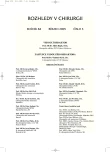Impact of Various Types of Artificial Nutrition on Postoperative Complications after Major Surgery of Upper Gastrointestinal Tract
Porovnání vlivu různých druhů umělé výživy na pooperační komplikace po velkých chirurgických výkonech
Úvod:
Ačkoliv současné zkušenosti preferují časné pooperační podávání enterální výživy před výživou parenterální, neexistují jednoznačné závěry svědčící o klinickém přínosu tohoto způsobu výživy u pacientů po velkých resekčních výkonech na horním zažívacím traktu.
Cíl:
Porovnat klinický význam různých druhů umělé výživy srovnáním výskytu pooperačních komplikací.
Metody:
Prospektivní randomizovaná kontrolovaná klinická studie. Analyzováno bylo 62 pacientů. Ve skupině I (21 pacientů) byla podávána úplná parenterální výživa, ve skupině II (20 pacientů) byla podávána standardní enterální výživa, ve skupině III (21 pacientů) byla podávána enterální výživa obohacená glutaminem, argininem a ω-3 mastnými kyselinami. Oba druhy enterální výživy byly podávány časně. Všechna tři vyživovací schémata byla isokalorická a izoproteinemická. Výsledky: Celkově bylo komplikacemi postiženo 31 pacientů (v jednotlivých skupinách 11, 11, resp. 9). Zemřeli 3 pacienti ve skupině I, 2 pacienti ve skupině II a jeden ve skupině III. Nedošlo k signifikantnímu rozdílu na hladině p < 0,05 ve výskytu jednotlivých pooperačních komplikací infekčního i neinfekčního původu.
Závěr:
Studie neprokázala vliv různých druhů umělé výživy na klinický průběh u pacientů po velkých resekčních výkonech na horním zažívacím traktu. Ani u skupiny pacientů s enterální výživou nedošlo k významnému snížení infekčních komplikací. Optimální se jeví kombinace parenterálního a enterálního příjmu po rozsáhlých výkonech na horním gastrointestinálním traktu. Je potřeba rozsáhlejších studií s větším počtem lépe stratifikovaných pacientů k zjištění případného přínosu různých druhů umělé výživy v pooperačním období.
Klíčová slova:
umělá výživa – velké chirurgické operace – pooperační komplikace – časná enterální výživa – imunonutrice
Authors:
I. Satinský
; M. Mitták; A. Foltýs; J. Kretek; J. Dostalík
Authors‘ workplace:
Chirurgická klinika, Fakultní nemocnice s poliklinikou, Ostrava-Poruba
přednosta doc. MUDr. J. Dostalík, CSc.
Published in:
Rozhl. Chir., 2005, roč. 84, č. 3, s. 134-141.
Category:
Monothematic special - Original
Overview
Background:
The present rationale appears to prefer early postoperative enteral nutrition to total parenteral nutrition. But no clear conclusions exist for demonstrating the clinical benefit of early postoperative enteral nutrition in patients after the major surgical resections of upper gastrointestinal tract.
Aim:
To compare the clinical impact of various types of the artificial nutrition by comparison of the postoperative complications.
Methods:
Prospective, randomized, controlled clinical trial. Sixty-two patients were analyzed. In the group I (21 patients) the total parenteral nutrition was received, in the group II (20 patients) the standard enteral nutrition was received, in the group III (21 patients) the enteral nutrition enriched with glutamin, arginin and ω-3 fatty acids was received. Both enteral feedings were given early. All three nutritional regiments were isocaloric and isoproteinaceus.
Results:
The postoperative complications were in 31 patients overall (11, 11, 9 patients in the each group I, II, III). Three patients died in the group I, 2 patients in the group II, and 1 patient in the group III. There were no significance differences (p < 0,05) in postoperative complications, both infectious and non-infectious reasons.
Conclusion:
The study has shown no impact of various type of artificial nutrition on clinical outcome in patients after major resections of upper gastrointestinal tract. There was no significant difference in infectious complications in the groups with enteral feeding. The combination of enteral and parenteral nutrition appears as optimum after major surgery of the upper gastrointestinal tract. It is necessary to realize more extensive studies of homogenous patients to find out the benefit of various types of arteficial nutrition in postoperative period.
Key words:
artificial nutrition – major surgery – postoperative complications – early enteral nutriton – immunonutrition
Labels
Surgery Orthopaedics Trauma surgeryArticle was published in
Perspectives in Surgery

2005 Issue 3
- Possibilities of Using Metamizole in the Treatment of Acute Primary Headaches
- Metamizole at a Glance and in Practice – Effective Non-Opioid Analgesic for All Ages
- Metamizole vs. Tramadol in Postoperative Analgesia
-
All articles in this issue
- An Inflammatory Aneurysm of the Abdominal Aorta
- Sentinel Node Biopsy in Breast Cancer. Technique and Indication – Standard of Care
- Acute Bleeding in the Crohn’s Disease
- Intraperitoneal Placement of Composite Material – Polyester Mesh with Coat of Polyurethane in Experimental Study
- Impact of Various Types of Artificial Nutrition on Postoperative Complications after Major Surgery of Upper Gastrointestinal Tract
- Implantations of Venous Ports – the Latest Advances
- The Malignant Melanoma Metastasis into the Stomach Corpus
- Transplantation of the Lung Lobe
- Perspectives in Surgery
- Journal archive
- Current issue
- About the journal
Most read in this issue
- Implantations of Venous Ports – the Latest Advances
- Acute Bleeding in the Crohn’s Disease
- The Malignant Melanoma Metastasis into the Stomach Corpus
- An Inflammatory Aneurysm of the Abdominal Aorta
